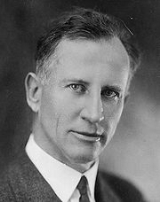
Max Mason
Encyclopedia
Charles Max Mason was an American
mathematician
. Mason was president of the University of Chicago
(1925–1929) and president
of the Rockefeller Foundation
(1929–1936).
Mason's mathematical research interests included differential equations, the calculus of variations
, and electromagnetic theory.
On May 2, 1945 he appeared on Edgar Bergen
's radio show to chat about the new observatory and trade jokes with Charlie McCarthy.
United States
The United States of America is a federal constitutional republic comprising fifty states and a federal district...
mathematician
Mathematician
A mathematician is a person whose primary area of study is the field of mathematics. Mathematicians are concerned with quantity, structure, space, and change....
. Mason was president of the University of Chicago
University of Chicago
The University of Chicago is a private research university in Chicago, Illinois, USA. It was founded by the American Baptist Education Society with a donation from oil magnate and philanthropist John D. Rockefeller and incorporated in 1890...
(1925–1929) and president
President
A president is a leader of an organization, company, trade union, university, or country.Etymologically, a president is one who presides, who sits in leadership...
of the Rockefeller Foundation
Rockefeller Foundation
The Rockefeller Foundation is a prominent philanthropic organization and private foundation based at 420 Fifth Avenue, New York City. The preeminent institution established by the six-generation Rockefeller family, it was founded by John D. Rockefeller , along with his son John D. Rockefeller, Jr...
(1929–1936).
Mason's mathematical research interests included differential equations, the calculus of variations
Calculus of variations
Calculus of variations is a field of mathematics that deals with extremizing functionals, as opposed to ordinary calculus which deals with functions. A functional is usually a mapping from a set of functions to the real numbers. Functionals are often formed as definite integrals involving unknown...
, and electromagnetic theory.
Education
- B.Litt. , 1898, University of Wisconsin-Madison
- Ph.D., Mathematics, University of Göttingen, 1903.
- Dissertation: "Randwertaufgaben bei gewöhnlichen Differentialgleichungen" (Boundary value functions with ordinary differential equations
- Advisor: HilbertDavid HilbertDavid Hilbert was a German mathematician. He is recognized as one of the most influential and universal mathematicians of the 19th and early 20th centuries. Hilbert discovered and developed a broad range of fundamental ideas in many areas, including invariant theory and the axiomatization of...
Career
- Massachusetts Institute of Technolology (MIT), 1903–1904, Instructor of MathematicsMathematicsMathematics is the study of quantity, space, structure, and change. Mathematicians seek out patterns and formulate new conjectures. Mathematicians resolve the truth or falsity of conjectures by mathematical proofs, which are arguments sufficient to convince other mathematicians of their validity...
. - Yale UniversityYale UniversityYale University is a private, Ivy League university located in New Haven, Connecticut, United States. Founded in 1701 in the Colony of Connecticut, the university is the third-oldest institution of higher education in the United States...
, 1904–1908, Assistant Professor of Mathematics. - University of Wisconsin–MadisonUniversity of Wisconsin–MadisonThe University of Wisconsin–Madison is a public research university located in Madison, Wisconsin, United States. Founded in 1848, UW–Madison is the flagship campus of the University of Wisconsin System. It became a land-grant institution in 1866...
, 1908–1909, University of Wisconsin–Madison, Associate Professor of Mathematics, - University of Wisconsin–Madison, 1909–1925, Professor of PhysicsPhysicsPhysics is a natural science that involves the study of matter and its motion through spacetime, along with related concepts such as energy and force. More broadly, it is the general analysis of nature, conducted in order to understand how the universe behaves.Physics is one of the oldest academic...
.- National Research CouncilUnited States National Research CouncilThe National Research Council of the USA is the working arm of the United States National Academies, carrying out most of the studies done in their names.The National Academies include:* National Academy of Sciences...
, 1917–1919, Submarine Committee. (Invented a submarineSubmarineA submarine is a watercraft capable of independent operation below the surface of the water. It differs from a submersible, which has more limited underwater capability...
detection device, which was the basis for sonarSonarSonar is a technique that uses sound propagation to navigate, communicate with or detect other vessels...
detectors used in World War IIWorld War IIWorld War II, or the Second World War , was a global conflict lasting from 1939 to 1945, involving most of the world's nations—including all of the great powers—eventually forming two opposing military alliances: the Allies and the Axis...
.)
- National Research Council
- University of Chicago, 1925–1928, President.
- Rockefeller Foundation, 1928–1929, Director, Natural Sciences Division.
- Rockefeller Foundation, 1929–1936 , President.
- Palomar ObservatoryPalomar ObservatoryPalomar Observatory is a privately owned observatory located in San Diego County, California, southeast of Pasadena's Mount Wilson Observatory, in the Palomar Mountain Range. At approximately elevation, it is owned and operated by the California Institute of Technology...
(California), 1936–1949, Chairman of the team directing the construction of the observatory.
On May 2, 1945 he appeared on Edgar Bergen
Edgar Bergen
Edgar John Bergen was an American actor and radio performer, best known as a ventriloquist.-Early life:...
's radio show to chat about the new observatory and trade jokes with Charlie McCarthy.
External links
- Mathematicians: Charles Max Mason from the School of Mathematical and Computational Sciences, University of St. Andrews, Scotland
- Max Mason from the University of Chicago

